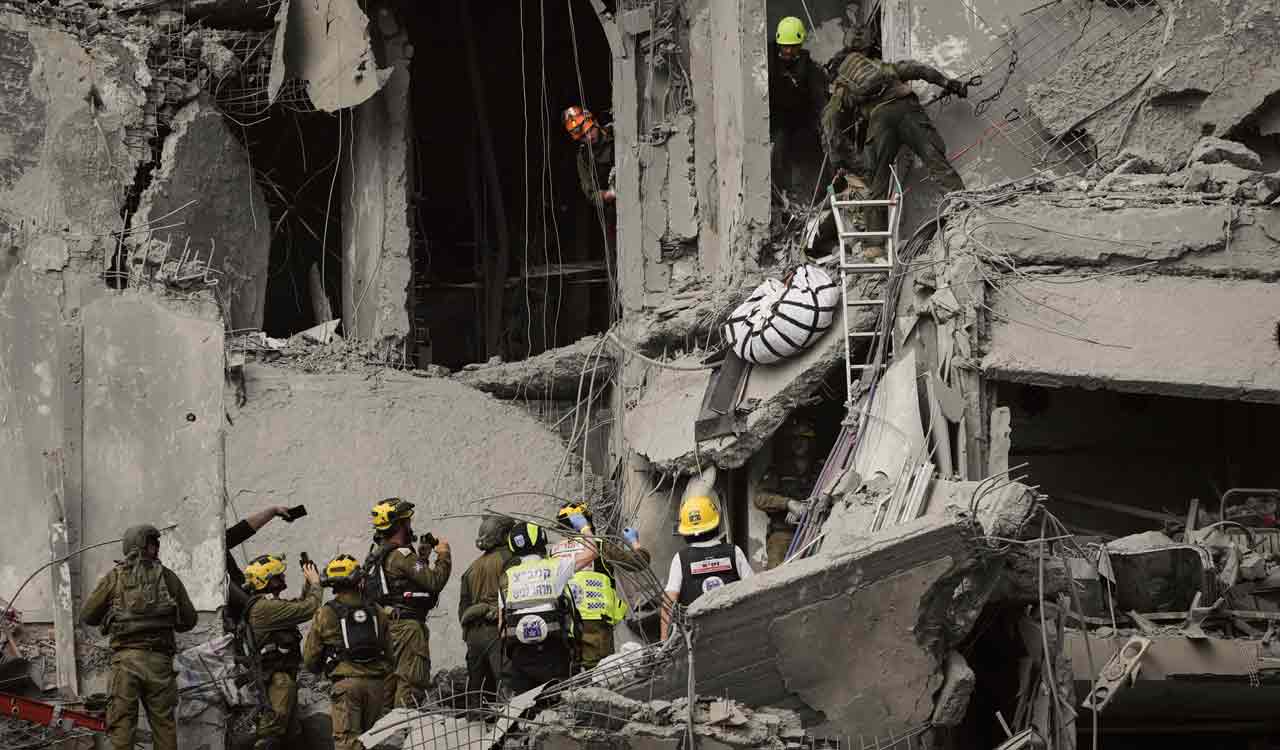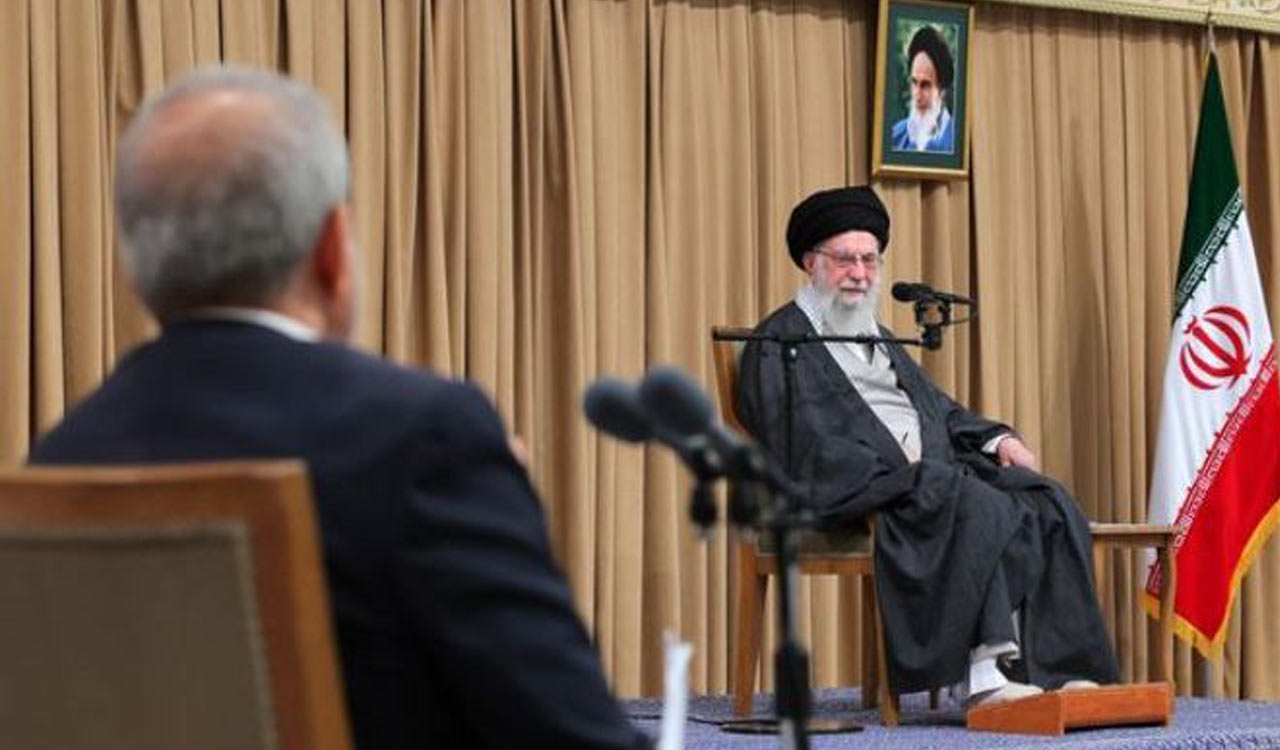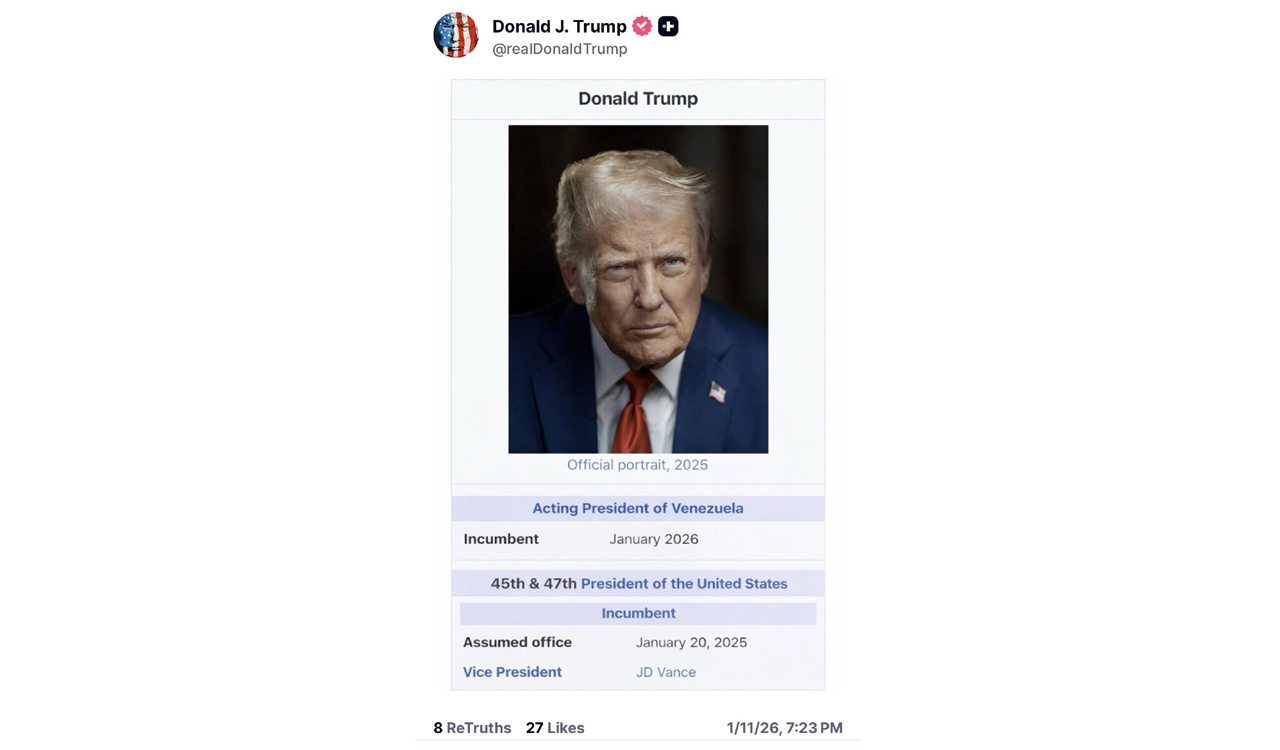Iranian missile barrage strikes Israel after deadline Trump announced for ceasefire passes
US President Donald Trump announced a tentative ceasefire between Israel and Iran after Tehran’s missile retaliation on a US base in Qatar. However, Iran continued to strike Israel, killing civilians. Israel hasn’t confirmed the ceasefire, maintaining ambiguity over its intentions

Dubai: US President Donald Trump announced that Israel and Iran had agreed to a “complete and total ceasefire” soon after Iran launched a limited missile attack on Monday on a US military base in Qatar, retaliating for the American bombing of its nuclear sites. But the status of a possible ceasefire remained tentative after an Iranian missile barrage struck Israel after a first deadline for the proposal.
The Iranian barrages sent Israelis hurrying into bomb shelters as the sun rose, killing at least four people and injuring eight others, Israel’s Magen David Adom rescue services said. Israel has yet to acknowledge Trump’s proposal, which gives Israel more time to potentially strike back though Iran on its state television announced an overall ceasefire had begun at 7:30 am local time.
In Beersheba, first responders said they retrieved four bodies from one building and were searching for more. The streets around the impact site were littered with glass and debris, windows were blown out of buildings as anxious neighbours stood outside their damaged houses. Three people were rescued from nearby buildings.
The direct hit in the largest city in southern Israel came just days after the city’s hospital sustained significant damage in a missile strike. The Israeli military said people could leave bomb shelters but cautioned the public to stay close to shelter for the coming hours.
Trump’s announcement that Israel and Iran had agreed to a “complete and total ceasefire” came soon after Iran launched a limited missile attack on Monday on a U.S. military base in Qatar, retaliating for the American bombing of its nuclear sites. Israel has not acknowledged the Trump ceasefire announcement.
Trump’s announcement on Truth Social said the ceasefire beginning about midnight Washington time would bring an “Official END” to the war.
Writing over an hour after the first phase of the tentative ceasefire, which called for Iran to halt its attacks, Trump added: “THE CEASEFIRE IS NOW IN EFFECT. PLEASE DO NOT VIOLATE IT! DONALD J. TRUMP, PRESIDENT OF THE UNITED STATES!” Israel doesn’t confirm ceasefire but appears to pause strikes
Israel did not immediately acknowledge any ceasefire, but there were no reports of Israeli strikes in Iran after 4 am in Tehran. Heavy Israeli strikes continued in Iranian cities until shortly before that time. Israel in other conflicts has stepped up its strikes just before ceasefires took effect.
“As of now, there is NO agreement’ on any ceasefire or cessation of military operations,” Iranian Foreign Minister Abbas Araghchi wrote in a post on X. “However, provided that the Israeli regime stops its illegal aggression against the Iranian people no later than 4 am Tehran time, we have no intention to continue our response afterwards.” His message was posted at 4:16 am Tehran time.
Araghchi added: “The final decision on the cessation of our military operations will be made later.” The Israeli military declined to comment on Trump’s ceasefire statement and the office of Israeli Prime Minister Benjamin Netanyahu did not immediately respond to a message seeking comment.
Trump describes conflict as ’12 Day War’
Trump gave the conflict between Israel and Iran a name: the “12 Day War.” That recalls the 1967 Mideast war, known by some as the “Six Day War,” in which Israel fought a group of Arab countries including Egypt, Jordan and Syria.
Trump’s reference carries emotional weight for the Arab world, particularly Palestinians. In the 1967 war, Israel captured the West Bank and east Jerusalem from Jordan, the Gaza Strip and the Sinai Peninsula from Egypt, and the Golan Heights from Syria. Though Israel later gave the Sinai back to Egypt, it still holds the other territories.
Trump communicated directly with Israeli Prime Minister Benjamin Netanyahu to secure the ceasefire, according to a senior White House official who insisted on anonymity to discuss the Monday talks. Vance, Secretary of State Marco Rubio and special envoy Steve Witkoff communicated with the Iranians through direct and indirect channels.
The White House has maintained that the Saturday bombing helped get the Israelis to agree to the ceasefire and that the Qatari government helped to broker the deal.
It’s unclear what role Ayatollah Ali Khamenei, Iran’s leader, played in the talks. He said earlier on social media that he would not surrender.
Iran attacked a US base in Qatar on Monday, but appeared to indicate it was prepared to reduce tensions. The US was warned by Iran in advance, and there were no casualties, said Trump, who dismissed the attack as a “very weak response.”
Qatar condemned the attack on Al Udeid Air Base as “a flagrant violation” of its sovereignty, airspace and international law. Qatar said it intercepted all but one missile, though it was not clear if that missile caused any damage.
Iran said the volley matched the number of bombs dropped by the United States on Iranian nuclear sites over the weekend. Iran also said it targeted the base because it was outside of populated areas.
Qatar Maj Gen Shayeq Al Hajri said 19 missiles were fired at the base that is home to the Combined Air Operations Center, which provides command and control of air power across the region, as well as the 379th Air Expeditionary Wing, the largest such wing in the world.
Trump said 14 missiles were fired, 13 were knocked down and one was “set free” because it posed no threat.
Iran announced the attack on state television, with a caption calling it “a mighty and successful response” to “America’s aggression.”
Earlier reports that a missile was launched at a base housing American forces in Iraq were a false alarm, a senior US military official said. The official said debris from a malfunctioning Iranian missile targeting Israel had triggered an alert of an impending attack on the Ain al-Assad base.
By early Tuesday, Qatar Airways resumed its flights after Qatar shut down its airspace over the Iranian attack on Al Udeid Air Base. Flight-tracking data showed commercial aircraft again flying in Qatari airspace, signaling Doha believed the threat on the energy-rich nation had passed.
The Israel Airport Authority said that the barrages from Iran forced them to close the country’s skies for sevearl hours to all passenger planes that were expected to land and depart, including emergency flights.
Some flights were forced to circle over the Mediterranean Sea, according to Israeli media.
Israel’s airports have been closed since the war with Iran began, but a handful of emergency flights had started arriving and departing over the past few days.
Several Iranian officials, including Atomic Energy Organization of Iran spokesman Behrouz Kamalvandi, have claimed Iran removed nuclear material from targeted sites ahead of time.
Related News
-
Deadly avalanche kills eight skiers in California
3 hours ago -
Ayodhya priest questions Telangana govt’s Ramzan relief move
4 hours ago -
Titans emerge champions in sixth Samuel Vasanth Kumar memorial basketball tournament
4 hours ago -
Hyd Open golf championship to kick off from February 19
4 hours ago -
Jammu and Kashmir enter Ranji Trophy final with win over Bengal
4 hours ago -
Telangana High Court seeks ground report on forest plantation at Damagundam
4 hours ago -
Sahibzada Farhan century powers Pakistan to big win over Namibia
4 hours ago -
Chief Minister’s Cup 2025 sees record participation across Telangana
4 hours ago




